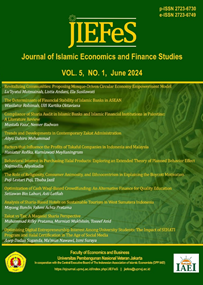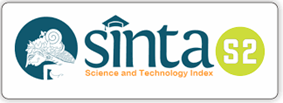Behavioral Interest in Purchasing Halal Products: Exploring an Extended Theory of Planned Behavior Effect
DOI:
https://doi.org/10.47700/jiefes.v5i1.7627Keywords:
Theory of Planned Behavior, Trust, Purchase Interest Behavior, Halal ProductsAbstract
Indonesia has a large Muslim population reaching 209.1 million people or around 13.1 percent of the world's Muslim population, with the millennial generation as the largest generation, reaching 34 percent of Indonesia's population, in terms of buying behavior, the millennial generation is the subject of this study, they have a wishy-washy buying behavior, more likely to see the brand than see the halal label, so that sales of products not labeled halal are higher than products labeled halal. This study aims to determine the effect of attitude, perceived controlled behavior, subjective norms, and trust on the purchase intention behavior of halal products. The method used in this research is quantitative, with a population of millennial people in Banten Province who have consumed halal products, with a sample of 170 respondents, and the data collection technique using a questionnaire. The data was processed using Smart PLS 3.2.9 software and analyzed using the structural equation modeling (SEM) method with a partial least square (PLS) approach. The results of this study indicate that attitude and perceived controlled behavior have a significant positive effect on the purchase intention behavior of halal products, while subjective norms and trust have no effect on the purchase intention behavior of halal products. The implication of this research is that the marketing strategy for halal products must focus on increasing positive attitudes and perceived controlled behavior of consumers. Efforts to build strong brands and facilitate access to halal products are more important than relying on subjective norms and trust. Marketing policies and campaigns should emphasize personal benefits and ease of obtaining halal products to increase purchase intention among consumers.
References
Adhitya Ananda, Nova, and Mikhratunnisa. 2020. “Keputusan Pembelian Produk Halal Pada Generasi Muslim (Genm).” Jurnal TAMBORA 4 (2A): 47–53. https://doi.org/10.36761/jt.v4i2a.774.
Ajzen, Icek. 2012. “The Theory of Planned Behavior.” Handbook of Theories of Social Psychology: Volume 1, no. January 2012: 438–59. https://doi.org/10.4135/9781446249215.n22.
Akgunduz, Yilmaz, and Firdevs Melis Cin. 2015. “Job Embeddedness as a Moderator of the Effect of Manager Trust and Distributive Justice on Turnover Intentions.” Anatolia 26 (4): 549–62. https://doi.org/10.1080/13032917.2015.1020504.
Amar, Faozan. 2017. “Implementasi Filantropi Islam Di Indonesia.” AL_URBAN: Jurnal Ekonomi Syariah Dan Filantropi Islam 2 (1): 1–10. https://doi.org/10.22236/alurban.
Amaro, Suzanne, and Paulo Duarte. 2016. “Travellers’ Intention to Purchase Travel Online: Integrating Trust and Risk to the Theory of Planned Behaviour.” Anatolia 27 (3): 389–400. https://doi.org/10.1080/13032917.2016.1191771.
Anggraini, Inar, and Diah Setyawati Dewanti. 2020. “The Effect of Halal Foods Awareness on Purchase Decision with Religiosity as a Moderating Variable.” Journal of Economics Research and Social Sciences 4 (1). https://doi.org/10.18196/jerss.040116.
Arikunto. 2010. Prosedur Penelitian: Suatu Pendekatan Praktik. Edisi Revi. Jakarta: Rineka Cipta.
Aryadhe, Trisdayana, Alit Suryani, and Ida Bagus Sudiksa. 2018. “PENGARUH SIKAP DAN NORMA SUBJEKTIF TERHADAP NIAT BELI DAN KEPUTUSAN PEMBELIAN.” E-Jurnal Manajemen Universitas Udayana 7 (3): 255052. https://doi.org/10.24843/EJMUNUD.2018.v7.i03.p12.
Ayu, Ipak. 2021. “Industri Kosmetika Diproyeksi Tumbuh 7 Persen Tahun Ini.” Ekonomi.Bisnis.Com. 2021. https://ekonomi.bisnis.com/read/20210412/257/1379994/industri-kosmetika-diproyeksi-tumbuh-7-persen-tahun-ini.
Azwar, Saifuddin. 2003. Sikap Manusia Teori Dan Pengukurannya. 2nd ed. Yogyakarta: Pustaka Pelajar.
Bayu, Dimas. 2022. “Sebanyak 86,9% Penduduk Indonesia Beragama Islam.” Dataindonesia.Id. 2022. https://dataindonesia.id/ragam/detail/sebanyak-869-penduduk-indonesia-beragama-islam.
Choi, Dooyoung, and Kim K.P. Johnson. 2019. “Influences of Environmental and Hedonic Motivations on Intention to Purchase Green Products: An Extension of the Theory of Planned Behavior.” Sustainable Production and Consumption 18 (xxxx): 145–55. https://doi.org/10.1016/j.spc.2019.02.001.
Diamant, Jeff. 2019. “The Countries with the 10 Largest Christian Populations and the 10 Largest Muslim Populations.” Pew Research Center. 2019. https://www.pewresearch.org/short-reads/2019/04/01/the-countries-with-the-10-largest-christian-populations-and-the-10-largest-muslim-populations/.
Elseidi, Reham I. 2018. “Determinants of Halal Purchasing Intentions: Evidences from UK.” Journal of Islamic Marketing 9 (1): 167–90. https://doi.org/10.1108/JIMA-02-2016-0013.
Ferdindand. 2002. Structural Equation Modeling Dalam Penelitian Manajemen. Edisi Revi. Semarang: Badan Penelitian Universitas Diponegoro.
Ham, Marija, Marina Jeger, and Anita Frajman Ivković. 2015. “The Role of Subjective Norms in Forming the Intention to Purchase Green Food.” Economic Research-Ekonomska Istrazivanja 28 (1): 738–48. https://doi.org/10.1080/1331677X.2015.1083875.
Hamid, Rahmad Solling, and Suhardi M Anwar. 2019. Structural Equation Modelling (SEM) Berbasis Varian. Jakarta Pusat: Institut Penulis Indonesia.
Han, Heesup, Li Tzang (Jane) Hsu, and Chwen Sheu. 2010. “Application of the Theory of Planned Behavior to Green Hotel Choice: Testing the Effect of Environmental Friendly Activities.” Tourism Management 31 (3): 325–34. https://doi.org/10.1016/j.tourman.2009.03.013.
Hasrina, Cut Delsie, Yusri Yusri, and Dwi Rianda Agusti Sy Sy. 2019. “Pengaruh Akuntabilitas Dan Transparansi Lembaga Zakat Terhadap Tingkat Kepercayaan Muzakki Dalam Membayar Zakat Di Baitul Mal Kota Banda Aceh.” Jurnal Humaniora : Jurnal Ilmu Sosial, Ekonomi Dan Hukum 2 (1): 1–9. https://doi.org/10.30601/humaniora.v2i1.48.
Hsu, Chia Lin, Chi Ya Chang, and Chutinart Yansritakul. 2017. “Exploring Purchase Intention of Green Skincare Products Using the Theory of Planned Behavior: Testing the Moderating Effects of Country of Origin and Price Sensitivity.” Journal of Retailing and Consumer Services 34 (October 2016): 145–52. https://doi.org/10.1016/j.jretconser.2016.10.006.
Huang, Xiangqian, and Jianping Ge. 2019. “Electric Vehicle Development in Beijing: An Analysis of Consumer Purchase Intention.” Journal of Cleaner Production 216: 361–72. https://doi.org/10.1016/j.jclepro.2019.01.231.
Ibnunas, Bintang Ghaliyan, and Tri Harjawati. 2021. “Pengaruh Religiusitas Terhadap Minat Pembelian Produk Halal.” Jurnal Ilmiah Mahasiswa 1 (2): 85–100. https://doi.org/10.32493/jmw.v1i2.10105.
Iranmanesh, Mohammad, Maryam Mirzaei, Seyed Mehrshad Parvin Hosseini, and Suhaiza Zailani. 2020. “Muslims’ Willingness to Pay for Certified Halal Food: An Extension of the Theory of Planned Behaviour.” Journal of Islamic Marketing 11 (1): 14–30. https://doi.org/10.1108/JIMA-03-2018-0049.
Jeon, Hyeon Gyu, Cheong Kim, Jungwoo Lee, and Kun Chang Lee. 2021. “Understanding E-Commerce Consumers’ Repeat Purchase Intention: The Role of Trust Transfer and the Moderating Effect of Neuroticism.” Frontiers in Psychology 12 (June): 1–14. https://doi.org/10.3389/fpsyg.2021.690039.
Khasanah, Noor Maulida, and Agus Supriyanto. 2022. “Minat Beli Produk Halal Samyang Food Ditinjau Dari Theory Of Planned Behavior Pada Generasi Muslim Di Kabupaten Kudus.” Amkop Management Accounting Review (AMAR) 2 (1): 28–41. https://doi.org/10.37531/amar.v2i1.134.
Linkumkm. 2024. “7 Juta Produk UMKM Belum Bersertifikat Halal Menurut Kemenkop.” Linkumkm.Id. 2024. https://linkumkm.id/news/detail/14387/7-juta-produk-umkm-belum-bersertifikat-halal-menurut-kemenkop.
Liu, Matthew Tingchi, Yongdan Liu, and Ziying Mo. 2020. “Moral Norm Is the Key: An Extension of the Theory of Planned Behaviour (TPB) on Chinese Consumers’ Green Purchase Intention.” Asia Pacific Journal of Marketing and Logistics 32 (8): 1823–41. https://doi.org/10.1108/APJML-05-2019-0285.
Mahliza, Febrina, and Prita Prasetya. 2021. “Determining Purchase Intention in Halal Personal Care Product: Study on Muslimah Millennial Generation.” Jurnal Aplikasi Manajemen 19 (2): 319–34. https://doi.org/10.21776/ub.jam.2021.019.02.08.
Mariana, Tessa, Dwi Suhartanto, and Arie Indra Gunawan. 2020. “Prediksi Minat Beli Makanan Cepat Saji Halal: Aplikasi Theory of Planned Behavior.” Prosiding Industrial Research Workshop and National Seminar 11 (1): 1180–85.
Mohajerani, Somayeh, Sharareh Zarean Shahrekordi, and Mitra Azarlo. 2015. “The Impact of Privacy and Security Concerns, Trust in Technology and Information Quality on Trust in e-Government and Intention to Use e-Government.” 2015 9th International Conference on E-Commerce in Developing Countries: With Focus on e-Business, ECDC 2015, no. April: 1–6. https://doi.org/10.1109/ECDC.2015.7156332.
MUI, LPPOM. 2021. “Awas, Hindari Kosmetik Haram Dan Najis.” Halalmui.Org. 2021. https://halalmui.org/mui14/main/detail/awas-hindari-kosmetik-haram-dan-najis.
Najmudin, Najmudin, Syihabudin Syihabudin, and Ahmad Fatoni. 2021. “The Effect of Halal Awareness and Food Ingredients on Consumer Interests of Culinary Seafood Beach Tourism.” ISLAMICONOMIC: Jurnal Ekonomi Islam 12 (1): 23–38. https://doi.org/10.32678/ijei.v12i1.273.
Najmudin, and Shihabudin. 2022. “Subjective Norms and Behavioral Control: The Effectiveness on Interest in Sharia Insurance.” Jurnal Ilmiah Ekonomi Islam 8 (01): 39–46.
Nugroho, Anton, Mukhamad Najib, and Megawati Simanjuntak. 2018. “Factors Affecting Consumer Interest In Electronic Money Usage With Theory Of Planned Behavior (TPB).” Journal of Consumer Sciences 3 (1): 15. https://doi.org/10.29244/jcs.3.1.15-27.
Nurcahyo, Agung, and Herry Hudrasyah. 2017. “The Influence of Halal Awareness, Halal Certification, and Personal Societal Purchase Intention.” Journal of Business and Management 6 (1): 21–31.
Nurofik, Nurofik. 2013. “Pengaruh Sikap, Norma Subyektif, Dan Kontrol Perilaku Pada Pengungkapan Tanggung Jawab Sosial.” Jurnal Akuntansi & Auditing Indonesia 17 (1): 43–56. https://doi.org/10.20885/jaai.vol17.iss1.art4.
Pinasthika, Danu Gilang, Agus Suroso, and Siti Zulaikha Wulandari. 2021. “The Analysis of Intention To Buy: An Extended Theory of Planned Behavior.” Journal of Management and Islamic Finance 1 (1): 91–109. https://doi.org/10.22515/jmif.v1i1.3559.
Puspita, Wanda A, Sunaryo, and Risna Wijayanti. 2020. “The Effects between Religious Belief, Halal Logo, and Halal Product Knowledge on Purchase Intention Mediated by Halal Awareness (Study on Consumers Of Beverage Franchise Products In Malang).” South East Asia Journal of Contemporary Business, Economics and Law 21 (5): 306–19.
Rizkitysha, Talita Leoni, and Arga Hananto. 2022. “‘Do Knowledge, Perceived Usefulness of Halal Label and Religiosity Affect Attitude and Intention to Buy Halal-Labeled Detergent?’” Journal of Islamic Marketing 13 (3): 649–70. https://doi.org/10.1108/JIMA-03-2020-0070.
Shuhaiber, Ahmed. 2018. The Role of Perceived Control, Enjoyment, Cost, Sustainability and Trust on Intention to Use Smart Meters: An Empirical Study Using SEM-PLS. Advances in Intelligent Systems and Computing. Vol. 746. Springer International Publishing. https://doi.org/10.1007/978-3-319-77712-2_74.
Su, Yuandong, Asadullah Khaskheli, Syed Ali Raza, and Sara Qamar Yousufi. 2022. “How Health Consciousness and Social Consciousness Affect Young Consumers Purchase Intention towards Organic Foods.” Management of Environmental Quality: An International Journal 33 (5): 1249–70. https://doi.org/10.1108/MEQ-12-2021-0279.
Suk, Minho, Minki Kim, and Wonjoon Kim. 2020. “The Moderating Role of Subjective Norms and Self-Congruence in Customer Purchase Intentions in the LCC Market: Do Not Tell Me I Am Cheap.” Research in Transportation Business and Management, no. November: 100595. https://doi.org/10.1016/j.rtbm.2020.100595.
Sururi, M. 2021. “Preferensi Konsumen Dalam Pembelian Produk Yang Dipasarkan Di Supermarket TIP TOP Cabang Ciputat.” Jurnal Bisnis, Keuangan, Dan Ekonomi Syariah 1 (1): 47–56.
Syihabudin, Syihabudin, and Najmudin Najmudin. 2023. “The Purchasing Decisions of Sharia Insurance Products During Covid-19 Period; Effectiveness of Theory Planned Behavior.” Amwaluna: Jurnal Ekonomi Dan Keuangan Syariah 7 (2): 185–95. https://ejournal.unisba.ac.id/index.php/amwaluna/article/view/9442.
Tan, Chin Seang, Hooi Yin Ooi, and Yen Nee Goh. 2017. “A Moral Extension of the Theory of Planned Behavior to Predict Consumers’ Purchase Intention for Energy-Efficient Household Appliances in Malaysia.” Energy Policy 107 (May): 459–71. https://doi.org/10.1016/j.enpol.2017.05.027.
Widyanto, Hanif Adinugroho, and Muhammad Khalil Irfanur. 2019. “Faith-Based Marketing: Antecedents of Purchase Intention for Halal-Certified Personal Care Products.” Jurnal Muara Ilmu Ekonomi Dan Bisnis 3 (2): 421. https://doi.org/10.24912/jmieb.v3i2.7338.
Windiana, Livia, and Desiana Nuriza Putri. 2021. “Pengaruh Logo Halal Terhadap Sikap Dan Minat Beli Konsumen UMM Bakery.” Jurnal Ekonomi Pertanian Dan Agribisnis 5 (4): 1206–16. https://doi.org/10.21776/ub.jepa.2021.005.04.22.
Yang, Sujin, and Yun Jung Lee. 2017. “Are the Factors Affecting Satisfaction and Actual Purchase the Same? Comparisons between Unplanned and Planned Purchase.” Journal of Fashion Marketing and Management 21 (2): 172–86. https://doi.org/10.1108/JFMM-04-2016-0034.
Yazdanpanah, Masoud, and Masoumeh Forouzani. 2015. “Application of the Theory of Planned Behaviour to Predict Iranian Students’ Intention to Purchase Organic Food.” Journal of Cleaner Production 107: 342–52. https://doi.org/10.1016/j.jclepro.2015.02.071.
Zailani, Suhaiza, Shima Jafarzadeh, Mohammad Iranmanesh, Davoud Nikbin, and Nur Izatul Irani Selim. 2018. “Halal Logistics Service Quality: Conceptual Model and Empirical Evidence.” British Food Journal 120 (11): 2599–2614. https://doi.org/10.1108/BFJ-07-2017-0412.
Zerbini, Cristina, Beatrice Luceri, and Donata Tania Vergura. 2017. “Leveraging Consumer’s Behaviour to Promote Generic Drugs in Italy.” Health Policy 121 (4): 397–406. https://doi.org/10.1016/j.healthpol.2017.01.008.
Zhao, Chunan, Ming Zhang, and Wenwen Wang. 2019. “Exploring the Influence of Severe Haze Pollution on Residents’ Intention to Purchase Energy-Saving Appliances.” Journal of Cleaner Production 212: 1536–43. https://doi.org/10.1016/j.jclepro.2018.12.134.
Zouiten, Sara. 2023. “Global Muslim Population Exceeds 2 Billion.” Moroccoworldnews.Com. 2023. https://www.moroccoworldnews.com/2023/04/354870/global-muslim-population-exceeds-2-billion.
Downloads
Published
Issue
Section
License
Copyright (c) 2024 Najmudin, Ahyakudin

This work is licensed under a Creative Commons Attribution 4.0 International License.
Authors who publish with this journal agree to the following terms:
- Authors retain copyright and grant the journal right of first publication with the work simultaneously licensed under a Creative Commons Attribution 4.0 International License that allows others to share the work with an acknowledgment of the work's authorship and initial publication in this journal.
- Authors can enter into separate, additional contractual arrangements for the non-exclusive distribution of the journal's published version of the work (e.g., post it to an institutional repository or publish it in a book), with an acknowledgment of its initial publication in this journal.
- Authors are permitted and encouraged to post their work online (e.g., in institutional repositories or on their website) before and during the submission process, as it can lead to productive exchanges, as well as earlier and greater citation of published work.

This work is licensed under a Creative Commons Attribution 4.0 International License.











